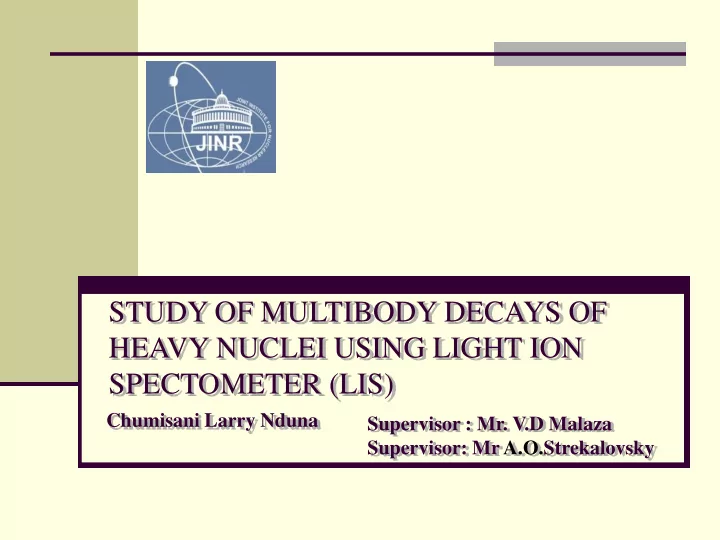

STUDY OF MULTIBODY DECAYS OF HEAVY NUCLEI USING LIGHT ION SPECTOMETER (LIS) Chumisani Larry Nduna Supervisor : Mr. V.D Malaza Supervisor: Mr A.O.Strekalovsky
OUTLINE Introduction Light Ion Spectrometer (LIS) Setup Experimental Challenges Calibration Process Results Conclusion
Introduction Nuclear Fission – Process where a heavy nucleus such as Uranium decays into two fragments of roughly equal masses, a process known as binary fission. Ternary Fission – In this decay channel the nucleus splits into three fragments with the third particle being too light compared to the main fission fragments. A new ternary decay of low excited nuclei called Collinear Cluster Tri- partition (CCT) was observed. Collinear Cluster Tri-partition (CCT) was observed in the fissioning of 252 Cf , using time-of-flight spectrometer known as Light ion Spectrometer (LIS)
Light Ion Spectrometer (LIS) Setup
Experimental Challenges The masses of fragments defining the modes under investigation differ radically. There is a challenge which involve measuring the correct energy and time- of-flight of heavy ions in the wide range of energies and masses using PIN diodes as “stop” detectors. This is due to the negative influence of the known “ plasma delay ” in registering time-of-flight of fission fragments and the “pulse -height defect ” (PHD) in registering energy of fission fragments using semiconductor detectors. To solve this challenge we have a special process called Calibration process.
Calibration Process Calibration process is divided into three steps: 1. Time calibration 2. 3-Point calibration 3. True calibration (PHD & PD taken into account) Time calibration and 3-point calibration – mass is approximated
Conclusion: The 3 Point Calibration process presented above proves to be a reliable mass approximation procedure. But it should be noted that the mass from the 3 point calibration suffers from the PHD and PD. A special procedure known as “True Calibration” has been developed which takes into account the PHD and PD. Therefore a true mass of the fission fragments can be obtained from this procedure.
Recommend
More recommend